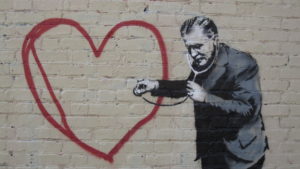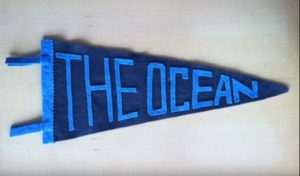Joe Solomon is an activist, organizer and writer currently based in West Virginia. He works as the Social Media Trainer for the Energy Action Coalition – a U.S. based youth climate justice group. Lately, he’s been interviewing “Meme Slingers” – designers and storytellers who lift up and connect environmental and social justice movements.
We’re excited to share Joe’s Meme Slinger interviews, starting with a conversation with Rachel Dearborn, Campaign Lab Director at Upwell and an accomplished network weaver who helps ocean advocates around the world break through the Internet.
– Team MobLab (who love the people like you, dear reader, who do this work!)
Where did you grow up? If you drew a picture of your home, what 5 (possibly fictional) colors would you use?
I grew up in Santa Monica, in a house 4 blocks from the beach that my maternal grandfather (Opa) bought before my mom was born. I’m one of those rare 3rd generation LA natives. The colors of home:
- Weathered brown, for the peeling paint on our decaying craftsman home.
- Desert green of the 20 foot cactus growing in our front yard (that aforementioned Opa planted when I was wee).
- Vibrant red of the bottlebrush flowers that would scatter over our cars when they were parked out front.
- Ocean mist blue, the early morning faded color of sky during 6 am walks with the dog.
- And, last but not least, meyer lemon, for the overburdened lemon tree in our yard that provided more than enough sweet lemons for our whole neighborhood.
Give us a break down of your average day at Upwell. What are the key moments of a typical day? What tools do you use, who’s there, how’s the coffee?
I get in between 9 and 9:30 and it’s tabs tabs tabs. I’m opening up links from google alerts (I’ve got as-they-happen alerts set up for whales, sharks, ocean acidification, overfishing, sustainable seafood, and marine protected areas – it makes for a lot of email). I’m scanning my “Oceans!” twitter list(which, at 500 members, is a real firehose for ocean content). I’m curating my Oceans Trove. I’m checking my oceans feed on Crowdtangle. I’m looking at the Upwell Facebook feed. I’m opening up a tab for anything and everything that seems interesting, and sticking the best of it all in the Upwell Firehose on Tumblr.
By about 11 am, I feel like I’ve read the Internet (or at least the oceany slice of it). Hopefully by then I’ve also had at least 2 cups of coffee.
Then I meet with whomever’s here – Andrew David Thaler, our Tide Report writer, and sometimes Rachel and/or Matt, and we figure out what’s worth campaigning on (here’s how we choose). What can we amplify? Then I spend the rest of the day figuring out how to do that – maybe it’s making a graphic or meme, pitching a journalist, rewriting the story for Buzzfeed, or whatever. We take juicy stories and make sure they’re packaged just right to be shared. We quickly write our Tide Report, which goes out to around 1,300 online communicators who then amplify to their networks.
I also spend a lot of my time on “network maintenance,” which is really just a fancy way of saying “taking care of Team Ocean” – giving spot counsel to orgs or advocates who want feedback on campaign content, or responding to tips sent to us (tips@upwell.us).
If I’m lucky, Rachel Weidinger, our fearless leader, will make lunch for the team out of the delicious produce that arrives in our Farm Fresh to You box. I take a picture and post it on Instagram, usually with the hashtag #winning or #lovemyjob.
But really, there is no typical day. Sometimes I’m running a Sharkinar. Sometimes we’re deep in a research project and I’m sifting through data from Topsy Pro or Radian6, trying to read the tea leaves and predict the tides of an issue-based conversation. Regardless of the day, however, I’m pretty likely to mix metaphors.
Can you talk about one stand-out example of how you’ve helped network weave the ocean movement? What piece of advice would you share for big-issue network weavers?
For every “Big Blue” group there’s a hundred little blues and individual voices for the ocean. We look at everyone – from organizations like Ocean Conservancy to research institutions like Scripps Institution of Oceanography to media properties like The Cove movie or The Dodo blog to individual scientists and advocates like David Shiffman (@whysharksmatter) to governmental agencies like NOAA – as part of one big team.
Team Ocean isn’t just for ocean conservationists, it’s for anyone who loves the ocean, so it’s inclusive of people who are fighting against pollution or working on climate issues. We preach a wide movement lens and practice inclusivity with near religious fervor. We promote unbranded content. We give away content we create for free. We give away our data analysis. Our funders make this possible by embracing our model of movement level metrics. We don’t report on mentions of Upwell – we report on mentions of ocean acidification or overfishing.
We can tell everyone in Team Ocean that if it’s good, we’ll help amplify it. We’ve worked hard to build trust in the tight-knit and competitive parts of the movement, and show the benefit of working as a movement. Our efforts around Shark Week (now in their third year) are a great example of this. On our Sharkinar, we get people from all corners of Team Ocean sharing their campaign plans and giving each other tips on how to effectively communicate science and conservation during Shark Week. There’s more participation, more sharing, more volume, and more high quality content coming out of Team Ocean than there was during Shark Week 2011. We’ve come a long way.
What digital organizing boundaries are you excited to push next? Said differently, what’s an innovative approach to online organizing or storytelling your want to explore in the near future?
I did a little happy dance when I saw Ocean Conservancy live-tweeting Sharknado 2: The Second Onethe other day. Upwell helped make that happen. Big orgs wouldn’t have touched that movie with a ten foot pole as recently as a few years ago but we’ve helped show (through data!) that the Internet has a life of its own. If you want to make change, inspire people, and increase attention to what matters to you, you have to find people where they are. I’ve been trying to push everyone’s boundaries for two years in this job. I think I might take a little break from it, and see where Team Ocean goes next. Our model is one of those “let’s do our job so well that we’re rendered irrelevant” ones.
Or maybe I just have a secret project I’m not telling you about. Mwa ha ha.
Can you give us a glimpse into your ocean love story? How did you fall in love with the oceans and her amazing creatures. Take us back to a moment when you started to feel drawn to the world of sharks, or another creature of the deep?
I guess it starts with ocean camp when I was a kid. I spent my summers getting carted up to Zuma beach in the early mornings to spend all day surfing, boogie boarding, snorkeling, and cavorting in the sand (horrible, I know). But, surprisingly, I think that experience inspired fear more than love. I remember getting tossed in waves, throat burning from swallowing sea water, and feeling seasick on the boat that took us out to snorkel. I remember sand crabs tickling my toes and making me jump around as I tried to enter the water. But despite my (healthy) reticence, I did form a bond with the water, which continued when I learned to sail and rowed competitively in high school and college.

I started to really learn about the ocean in my first job out of college, when I was working at a nonprofit communications firm and was put on a sustainable seafood project. I became fascinated with the complexity of the issue, and realized that the more I learned about the ocean, the more I realized how little I knew.
I fell in love with sharks slowly – we didn’t rush things. I remember, as a kid, telling my friends they didn’t need to be scared of sharks. I always felt a little tinge of hurt that they got such a bad rap. As I started to build my career around ocean conservation, I fell deep into the story of sharks, and humans’ relationship with them. They are an apex predator and also an apex conservation story. A gorgeous creature that is evolution incarnate, captivating hearts and minds, inspiring fear, awe and a kind of primordial fandom, and yet being reduced to catastrophically low population levels due to human greed.
I volunteered as a mentor with the Tatzoo project a couple years ago and decided to join the fellows in getting my favorite endangered animal – the scalloped hammerhead shark – tattooed on me as a symbol of my commitment to conservation and as a way to symbolically help preserve the species into the future. Now I have this incredible piece of art on me that is just about the best conversation starter – I’ve gotten to tell so many people their story.
What first got you interested in the world of using social media and digital organizing? How’d you end up rocking a computer to save the oceans? Why do you stick with it?
I made my first website when I was 14. I was one of those kids who wrote far too much about themselves online (livejournal teen angst FTW). I was that person who had Napster first and taught everyone what it did and how to use it. In college I worked at the computer help desk. My rowing teammates would call me even when I wasn’t working, and I could tell by their tone – “Rach-o?” – that it was a computer problem. “My mac just turned off and I don’t know why. Help meeee?”
I’ve always spent too much time on my computer, trying to read all of the internet and figuring out better ways to do things when things didn’t work right. When I was a sophomore in college I made a sign-up and donation website for a walk to end homelessness in Rhode Island when I was dismayed by their paper-dependent sign-up process, and that’s when the world of do-gooder internetting opened up to me. At the end of the day, I’m just a huge nerd that’s at home on the internet, and oh, also wants to save the planet.
How can folks find and connect with you in the social media universe?
- Twitter: @rdearborn and @Upwell
- Tumblr: fuckyeahsharks.tumblr.com
- Websites: upwell.us and rdearborn.com
Can you share three examples of Upwell memes you are most proud of?

We saw a scientific paper come out that talked about the potential effects of shutting down the entire high seas to fishing. We felt like the research results were super significant, but not packaged quite right. The biggest findings were buried in a long PDF, so we distilled it to an image that would inspire and surprise people.

In June of this year, the EPA set a new mandate to reduce emissions 30% by 2030. We shared this image with our network, and several of the organizations in Team Ocean shared it. Often, ocean organizations don’t talk about climate policy, and it’s because they’ve historically wanted to distance themselves from a polarized debate. We wanted to create an image that links to carbon emissions but introduces information about the ocean that’s new to people in a simplified way.

This is one of my favorites, and one we’ve used year after year. One of the biggest challenges we face in shark conservation is the legacy of Jaws. We wanted to overcome the fear associated with the oceans’ apex predators, and share a story of someone who had interacted directly with a shark, and still respects and wants to protect the animal. We shared this image a lot on Twitter during Shark Week’s annual “I Escaped Jaws” special.

Looking for more Meme Slinger Interviews? Check out earlier interviews here with people who are using the power of stories and social media to create real community change.




